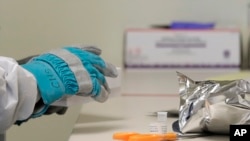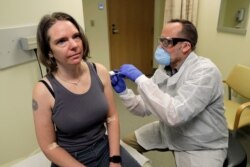The world crossed the one-million mark of confirmed COVID-19 cases this past week. With untold millions more possible in the months to come, scientists are committed to making a vaccine.
There's a lot about COVID-19 that scientists still don't know. They don't know entirely how it is spread. And without proven treatments or vaccines, good hygiene and staying away from other people are the only known methods of prevention.
Dr. Peter Hotez at Baylor College of Medicine started working on a coronavirus vaccine in 2003, during the outbreak of SARS, but after that, research funds dried up.
Hotez expects more coronaviruses to develop and spread. Some may be more benign that COVID-19, some far deadlier.
"Pandemics for coronaviruses have become a new normal. That we saw with SARS in 2003. We saw it in MERS s in 2012, and now this one. So we can expect a new major coronavirus every decade."
Which is all the more reason to develop a vaccine, even after the COVID-19 infections taper off and life gets back to normal.
"We're developing a vaccine for global health purposes. We're very concerned what happens when this virus moves into the crowded urban areas slums of Mumbai and Kolkata, and then Delhi, how do you practice social distancing, you basically can't so that's why a vaccine is going to be very important for places like India, and that's become our big priority right now."
Hotez is one of a number of scientists working on a vaccine for COVID-19, on treatments for the sick and methods to protect health care workers. He knows clean water is not available everywhere around the world, that it's possible that COVID-19 will be a recurring virus, and that there will likely be new coronaviruses emerging in the coming years.





